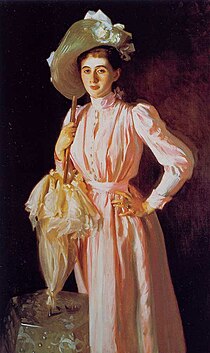Leverett Saltonstall
[2] Both families had deep colonial roots which could be traced to the Mayflower and a circle of friends which included future President Theodore Roosevelt.
He was active in varsity sports at Harvard, notably captaining the first American crew to win the Grand Challenge Cup at the Henley Royal Regatta in 1914.
[6] He also played football and hockey, scoring a dramatic overtime goal in a 1914 win over Hobey Baker's Princeton team.
[4] He served as a first lieutenant in the 301st Field Artillery Regiment in the 76th Division in World War I, spending six months in France.
He ran again for governor two years later, and won a decisive victory over former Boston Mayor James Michael Curley, who had been involved in a bruising Democratic primary fight against the incumbent Charles F. Hurley.
During his tenure, Saltonstall mediated a Teamsters strike, reduced taxes, and retired 90 percent of the state's debt.
Early in his first term, in April 1945 he was one of a dozen Senators and Congressmen who toured the Buchenwald Concentration Camp at the invitation of Gen. Dwight Eisenhower to attest to the reality of Nazi atrocities.
Together they had six children,[4] including: Saltonstall opted not to run for reelection in 1966, in part to provide an opportunity for his seat to Edward Brooke, a rising star in Massachusetts Republican circles.
[10] Leverett Saltonstall died of congestive heart failure in 1979 aged 86, and is buried in Harmony Grove Cemetery in Salem, Massachusetts.


